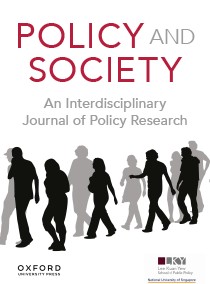Participatory governance in megaprojects: the Lyon–Turin high-speed railway among structure, agency, and democratic participation
IF 6.1
1区 社会学
Q1 POLITICAL SCIENCE
引用次数: 4
Abstract
Megaprojects are increasingly common across countries and attract substantial political attention from a variety of actors. Recent studies have highlighted the need to move from an understanding of megaprojects as linear and rational processes towards a more nuanced approach that accounts for non-linear and conflictual aspects. Participatory governance is often proposed as a valuable resource in this regard. In this paper, we investigate the setting and design of two participatory venues operating in the context of the implementation of the Lyon-Turin high-speed railway megaproject: the Italian Observatory for the Turin-Lyon Railway and the French Public Inquiry. Empirical evidence shows that the Italian case featured substantial structural barriers to effective democratic participation. As for the French case, while better designed and implanted in its context, it featured important agentic limitations that undermined its democratic potential. On the basis of our case study, we therefore argue that both the Observatory for the Turin-Lyon Railway and Public Inquiry failed to promote democratic participation. We thus propose a deliberative approach to (the study of) of megaprojects. Whereas deliberative democratic ideas command growing interest across disciplines, these have found only limited application in the study of megaprojects. We contend that a deliberative democratic approach holds promise to improve the democratic and epistemic qualities of decision making on megaprojects.大型项目中的参与式治理:里昂-都灵高速铁路的结构、机构和民主参与
大型项目在各国越来越普遍,并吸引了各种行动者的大量政治关注。最近的研究强调,需要从对大型项目的线性和理性过程的理解转向一种更细致入微的方法,以解释非线性和冲突方面。参与式治理经常被认为是这方面的宝贵资源。在本文中,我们研究了里昂-里昂高速铁路大型项目实施背景下的两个参与式场馆的设置和设计:都灵-里昂铁路意大利天文台和法国公共调查中心。经验证据表明,意大利的情况具有阻碍有效民主参与的重大结构性障碍。至于法国的情况,虽然在其背景下进行了更好的设计和植入,但它具有损害其民主潜力的重要的机构限制。因此,根据我们的案例研究,我们认为都灵-里昂铁路观察站和公共调查都未能促进民主参与。因此,我们提出一种审慎的方法来(研究)大型项目。尽管协商民主思想在各个学科引起了越来越多的兴趣,但在大型项目的研究中,它们的应用却很有限。我们认为,协商民主方法有望提高大型项目决策的民主和认知质量。
本文章由计算机程序翻译,如有差异,请以英文原文为准。
求助全文
约1分钟内获得全文
求助全文
来源期刊

Policy and Society
Multiple-
CiteScore
18.00
自引率
6.50%
发文量
43
审稿时长
30 weeks
期刊介绍:
Policy and Society is a prominent international open-access journal publishing peer-reviewed research on critical issues in policy theory and practice across local, national, and international levels. The journal seeks to comprehend the origin, functioning, and implications of policies within broader political, social, and economic contexts. It publishes themed issues regularly and, starting in 2023, will also feature non-themed individual submissions.
 求助内容:
求助内容: 应助结果提醒方式:
应助结果提醒方式:


